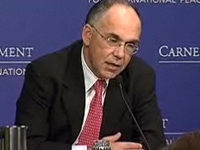Registration
Thank you!
You will receive an email confirming your registration.
The growing strength and assertiveness of the Kurdistan Regional Government (KRG) has alarmed Iraq’s neighbors and the Baghdad government. If ignored or badly handled, Kurdish aspirations have the potential to ignite violence and instability in Iraq and the region at a particularly delicate time.
To address the Kurdish issue and the role the United States can play in preventing conflict, Carnegie’s Henri Barkey; Kurdistan Regional Government representative Qubad Talabani; and the German Marshall Fund's Ian Lesser discussed Barkey’s report “Preventing Conflict Over Kurdistan”. Marina Ottaway moderated the discussion.
Steps Toward Preventing Conflict
Barkey explained that resolving the deadlock between the Iraqi government and the KRG over oil and gas revenue sharing is essential for preventing conflict in areas such as Kirkuk. The United States must help reach a resolution to this deadlock if it hopes to leave behind a stable Iraq. Solidifying the dialogue between Turkey and the KRG through U.S. involvement, and warming relations between Turkey and the KRG, would stabilize the region and aid in a smooth U.S. troop withdrawal. Another essential component to stability is disarming and demobilizing the Kurdistan Workers’ Party (PKK) with coordination between Turkey, KRG, and the United States.
Talabani stressed the importance of reaching an oil production sharing agreement between the Iraqi government and the KRG. Supporting the federal system outlined in Iraq’s constitution is crucial to maintaining stability in Iraq. The problem of disputed areas must be resolved.
Turkey’s Role
Barkey argued that Turkey’s internal Kurdish disputes must be addressed as well, with involvement from the European Union. Ian Lesser pointed to the economic inter-dependence between Turkey and the KRG. Turkey has a dominant trading position in the region and Kurdish separatism remains a real concern for Turkey. Lesser explained that Turkey’s approach to its domestic Kurdish problem should be used as a marker of Turkey’s progress as a democratic country, and therefore of its eligibility to join the EU.
Special Coordinator
Barkey recommended appointing a special coordinator to address the various dimensions of the Kurdish issue. Addressing the Kurdish aspect of the war in Iraq will not only ease the U.S. withdrawal, but also will reduce tensions with Syria and Iran, where there is widespread fear the United States may use the Kurdish populations in both countries to destabilize those governments. Qubad Talabani also welcomed the idea of appointing a special coordinator to serve as focal point for strategic dialogue. Ian Lesser stressed the need to clarify if Kurdish issues would be handled as part of the larger U.S. Middle East policy.
Questions & Answers:
In the questions and answers session the speakers addressed the importance of demilitarizing the PKK to instill more stability in the region; the role the United States must play in pushing for the implementation of the Iraqi constitution, thus the strengthening of federalism; and the importance of an agreement over control of energy resources in preventing conflict over Kurdistan.
In the questions and answers session the speakers addressed the importance of demilitarizing the PKK to instill more stability in the region; the role the United States must play in pushing for the implementation of the Iraqi constitution, thus the strengthening of federalism; and the importance of an agreement over control of energy resources in preventing conflict over Kurdistan.
Political ReformSecurityForeign PolicyNorth AmericaUnited StatesMiddle EastIranTürkiyeIraqSyriaWestern Europe
